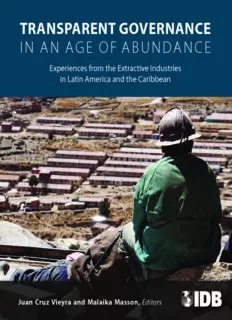Table Of ContentTRANSPARENT GOVERNANCE
I N A N A G E O F A B U N D A N C E
Experiences from the Extractive Industries
in Latin America and the Caribbean
Juan Cruz Vieyra and Malaika Masson, Editors
Transparent Governance
in an Age of Abundance
Experiences from the Extractive Industries
in Latin America and the Caribbean
Cataloging-in-Publication data provided by the
Inter-American Development Bank
Felipe Herrera Library
Transparent governance in an age of abundance: experiences from the extractive industries in Latin America
and the Caribbean / Juan Cruz Vieyra, Malaika Masson, editors.
p. cm.
Includes bibliographic references.
978-1-59782-187-2 (Paperback)
978-1-59782-188-9 (PDF)
1. Transparency—Management—Latin America. 2. Transparency—Management—Caribbean Area.
3. Mineral industries—Business planning—Latin America. 4. Mineral industries—Business planning—
Caribbean Area. 5. Energy—Law and legislation—Latin America. 6. Energy—Law and legislation—Caribbean
Area. I. Vieyra, Juan Cruz. II. Masson, Malaika. III. Inter-American Development Bank. Institutional Capacity of
the State Division. IV. Inter-American Development Bank. Energy Division.
HD9502.L32 T73
IDB-BK-129
Publication Code: IDB-BK-129
JEL codes: H50, H71, L71, L72, Q32, Q33, Q38, O54
Keywords: government policy, transparency in government, petroleum industry and trade, fuel trade, gas
industry, mineral industries.
The opinions expressed in this publication are those of the authors and do not necessarily reflect the views
of the Inter-American Development Bank, its Board of Directors, or the countries they represent.
The unauthorized commercial use of Bank documents is prohibited and may be punishable under the Bank’s
policies and/or applicable laws.
Copyright © 2014 Inter-American Development Bank. All rights reserved; may be freely reproduced for any
non-commercial purpose.
Inter-American Development Bank
1300 New York Avenue, N.W.
Washington, D.C. 20577
www.iadb.org
The Institutions for Development Sector and the Infrastructure and Environment Sector
were responsible for the production of this publication.
Production Editor: Sarah Schineller (A&S Information Specialists, LLC)
Editor: Leslie Hunter and Sarah Hunter
Design: Graphic Ideas Inc.
Proofreaders: Audrey Esquivel and Steven Nelson (TriLexica Editorial)
Cover Photo: Rafal Cichawa
Transparent Governance
in an Age of Abundance
Experiences from the Extractive Industries
in Latin America and the Caribbean
Juan Cruz Vieyra and Malaika Masson
Editors
Table of Contents
Foreword xiii
Endorsements xv
Overview xix
Message from the Editors xxiii
About the Editors xxvii
About the Contributors xxix
About the Authors xxxi
Introduction xxxix
Part I
Understanding the Governance Gap in the Extractive Industries
Chapter 1 Transparency Laws, Standards, and Benchmarks in the
Extractive Industries 3
Juan Cruz Vieyra, Malaika Masson, and Martin Walter
Chapter 2 Measuring up to Transparency and Accountability Standards:
Challenges and Opportunities for Effective Governance 39
Juan Carlos Quiroz
Chapter 3 From Dependency Theory to Local Governance: Evolution of
the Research on Extractive Industries and Development 77
Osmel Manzano
Table of Contents v
Chapter 4 Conflict and Natural Resources: Is the Latin American
and Caribbean Region Different from the Rest of the World? 109
Michael Ross
Part II
Legislation, Licensing and Contracts
Chapter 5 Implications of the Dodd-Frank Act and European Union
Rules on Transparency for Extractive Industries 147
Heather A. Lowe
Chapter 6 The Role of Information in the Allocation of Petroleum
Exploration and Production Rights 185
Rhea Brathwaite and María José Jarquín
Chapter 7 What Can We Learn from Oil Contracts? Clarifying the Links
Between Transparency and Accountability 215
Jordan Kyle
Chapter 8 Finding the Balance: Transparency and Accountability
versus Confidentiality in the Extractive Industries in Trinidad
and Tobago 255
Tira Greene and Mark Regis
Part III
Public Management and Fiscal Regimes
Chapter 9 Transparency in the Management of Revenues
from the Extractive Industries: The Case of Colombia 277
Diego Arisi and Ana Carolina González Espinosa
vi Table of Contents
Chapter 10 Fiscal Windfalls, Transparency, and the Efficiency of
Public Good Provision: Evidence from Brazilian Local
Governments 319
Martín Ardanaz
Chapter 11 Transforming Oil Abundance into Sector Performance:
Which Institutions Really Matter? 351
Lenin H. Balza, Ramón Espinasa, and Raul Jimenez Mori
Chapter 12 The Council on Ethics and the Extractive Industries 375
Pablo Valverde Martínez
Final Remarks
Chapter 13 Final Remarks 401
Juan Cruz Vieyra and Malaika Masson
Table of Contents vii
List of Figures and Tables
List of Figures
1 Resource Governance Index xli
1.1 The Relative Price Volatility of Commodities 9
1.2 GDP per Capita in Extractive Countries and Other Countries
by Governance Quality Terciles (in US$) 10
2.1 Relationship between the ILS Component and the WGI % Rank 53
2.2 RGI Scores and Rankings for LAC Countries (out of 58 countries) 62
3.1 Commodity Prices, 1870–1950 79
3.2 The Interactions of the Resource Sector 84
3.3 Room for Policy Improvement in Mining Institutions 88
3.4 Impact of Tax Systems on Oil Investment 89
3.5 Price Volatility, 1960–2013 91
4.1 Annual Conflict Rate, Oil and Non-oil States, 1960–2006 122
4.2 Ongoing Conflicts in the LAC Region, 1960–2006 125
4.3 Conflict Onsets in the LAC Region and the Rest of the World,
1960–2006 126
4.4 Ongoing Conflicts in the LAC Region and the Rest of the World
1960–2006 127
5.1 Extractive Industries Value Chain 173
7.1 Variation in Government Take Based on Field Profitability 227
7.2 Government Take 228
7.3 Government Take by Prospectivity 229
7.4 Assessing How Fiscal Systems Respond to Differences in Profitability,
1990s 235
7.5 Field Size 242
viii List of Figures and Tables
Description:and the Caribbean / Juan Cruz Vieyra, Malaika Masson, editors. Chapter 3. Transparency Laws, Standards, and Benchmarks in the Chapter 11.

